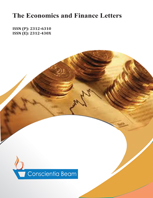Does Corruption Grease or Sand the Wheels of Economic Growth in Ghana? An ARDL Bounds Test
DOI:
https://doi.org/10.18488/journal.29.2020.72.162.178Abstract
This paper seeks to ascertain the relationship between corruption and economic growth in Ghana using time-series secondary data for the period 1984–2016. We employ auto-regressive distributed lags (ARDL) model to estimate the long-term relationship between corruption and economic growth in Ghana. Corruption is estimated to have a significant negative effect on per capita growth both in the short-term and long-term. While trade openness shows a positive effect on growth, inflation and capital formation show a significant negative influence on growth. We find the variables to be cointegrated and both the long-run and short-run parameters provide evidence of a negative relationship between corruption and economic growth. While capital formation and inflation also show negative effect on growth, trade openness shows a positive effect. The government should endeavour to effectively combat the destructive phenomena of corrupt practices that weaken the institutional quality through the adoption of functional regulatory measures. Transparency of governmental functions should be enhanced through the active involvement of citizens in governance as well as minimizing the discretion at the disposal of bureaucrats.

